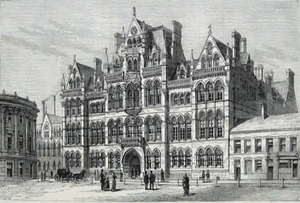Samuel Allport facts for kids
Quick facts for kids
Samuel Allport
|
|
|---|---|
| Born | January 23, 1816 |
| Died | July 7, 1897 (aged 81) Cheltenham, England
|
| Scientific career | |
| Fields | Petrology |
| Institutions | University of Birmingham |
Samuel Allport (January 23, 1816 – July 7, 1897) was an English scientist. He was known for studying rocks. This field of science is called petrology.
Contents
Samuel Allport's Life and Work
Samuel Allport was born in Birmingham, England. He also went to school there. Even though he worked in business for most of his life, he spent his free time studying rocks.
Early Discoveries
When he lived in Bahia, South America, for a short time, he studied the local rocks. He wrote about what he found. The Geological Society published his observations in 1860.
Studying Rocks Up Close
Allport's most important work was in microscopic petrology. This means he studied rocks using a microscope. He became interested in this because of another scientist, Dr. Henry Sorby. Samuel Allport was one of the first people to do this kind of rock study. He was very skilled at making his own thin slices of rock. These slices were so thin you could see through them. This helped him study the tiny parts of the rocks.
Important Rock Studies
Between 1869 and 1879, Allport studied many different types of rocks. He looked at:
- Basalt rocks from south Staffordshire.
- Diorite rocks from Warwickshire.
- Phonolite from a place called the Wolf Rock. He was the first to point out this rock.
- Pitchstone rocks from the Isle of Arran.
- Changed igneous rocks near Land's End.
He wrote about his findings in important science journals. These included the Quarterly Journal of the Geological Society and the Geological Magazine.
Later Life and Awards
In 1880, Samuel Allport became the librarian at Mason Science College. This college later became the University of Birmingham. He had to leave this job in 1887 because he became unwell.
In that same year, he received a special award. The Geological Society gave him the Lyell Medal. This medal is given to scientists who have done great work in geology. A few years later, he moved to Cheltenham. He passed away there in 1897.
 | Tommie Smith |
 | Simone Manuel |
 | Shani Davis |
 | Simone Biles |
 | Alice Coachman |


